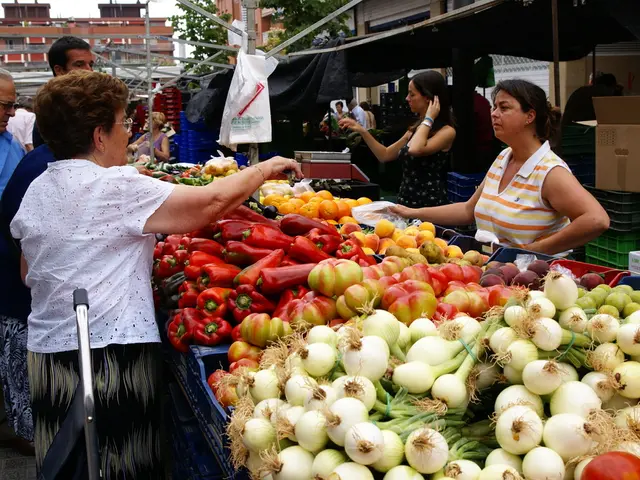Empathy, purpose, and small actions driving significant social change - insights from Neil Ghosh
In a world grappling with division and disconnection, the voice of 43-year-old Neil Ghosh offers a steady compass built on empathy, purpose, and action. A global development leader, philanthropist, and social entrepreneur, Ghosh has devoted decades to constructing equity and inclusion systems across continents. His upcoming book, "Do More Good," serves as a rallying cry to move beyond token gestures and delve into the heart of sustained, meaningful change.
At our website, we seek out change agents who embody conscious living, encompassing personal and political, spiritual, and systemic aspects. Ghosh is one such individual. With decades of experience spanning the nonprofit, government, philanthropic, and private sectors, his perspective on social change is both rare and deeply informed.
Ghosh's upcoming book, "Do More Good" (Post Hill Press, June 2025), offers insights drawn from 30 exceptional personalities, including Nobel Peace Prize laureate Malala Yousafzai, Mother Teresa, the Dalai Lama, President Joe Biden, former Senator John McCain, and business magnate Ross Perot. The book blends elements of memoir and manifesto, inviting readers to navigate lives of deeper meaning through service and empathy, providing stories that transcend inspiration and yield practical, lasting impact for future generations.
Currently, Ghosh serves as President of MGR Professional Services, Inc., a columnist at Patheos, and Senior Advisor to both the Ousri Foundation and the Healthy Climate Initiative. His prior leadership positions include CEO of SOS Children's Villages USA, Executive Vice President of the Global Fund for Children, and CEO of SNV Netherlands Development Organisation USA. His insights have appeared in leading media outlets such as CNN, Devex, The Washington Post, Voice of America, and the Stanford Social Innovation Review. His career exemplifies the essence of leadership grounded in empathy, humility, and justice.
In an exclusive interview, Ghosh reflects on his formative years, the spiritual paradoxes of India, the power of micro-altruism, and why the call to "do more good" is both urgent and universal. His reflections resonate with anyone yearning for a more just and compassionate world.
"This book contains Neil Ghosh's experiences with people and shows how they have positively impacted him. May this book provide positive inspiration to its readers." - His Holiness the Dalai Lama
What shaped Ghosh during his early years?
Ghosh credits his parents and his city (Kolkata) for molding him. Although they lacked conveniences such as gas stoves, refrigerators, and TVs, they possessed empathy. His mother cooked using a clay stove fueled by cow dung and coal, yet always found enough to share. His father took on additional projects to supplement his income and often hired struggling youth from their neighborhood, even if these ventures rarely turned a profit.
Ghosh learned that generosity stems not from abundance but from empathy. As a teenager, he founded the Calcutta Youth Club, where he orchestrated neighborhood cleanups and cultural programs. Although he had yet to encounter the term "agency," that was his initial taste of it-discovering that even a group of kids could instigate change.
How has India influenced Ghosh's sense of purpose?
Ghosh lived in the United States at age 22, like many of his peers. However, he returned to India ten years later to start a factory in Kolkata and create employment opportunities. Although the enterprise wasn't successful, he remained in India as head of the Australian Trade Commission for Eastern India for five years.
India taught Ghosh the intricacies of paradox, merging the sacred and the profane, the ancient and the modern. Solutions, he realized, rarely materialize in neat packages. He has observed poverty and kindness coexisting in the same alley, with each return trip to India serving as a spiritual and moral reset.
Ghosh's father spent time in prison for his beliefs. His own journey has included setbacks, discrimination, and despair. Yet, each low point has served as a turning point. India remains a compass for him, embodying humility, resilience, and pluralism.
Lately, Ghosh has reconnected with India in new ways. He supports the Calcutta Social Project and advises the Ousri Family Foundation on opportunities to support vulnerable children in India.
"Do More Good is an inspiring reminder that in our interconnected world, everyone has the power- and the responsibility-to make a difference in the lives of others. It couldn't come at a more important time." - President Bill Clinton
Why "Do More Good" instead of simply "Do Good"?
Ghosh explains that "good" is not a finishing point, but a constant practice. "Do More Good" symbolizes a call to action, urging readers to explore why inequity exists, embrace heroism in their own lives, and push beyond performative gestures into consistent, courageous action. The word "more" highlights the urgency of the present moment.
Was there a common denominator among the quiet changemakers in the book?
Indeed, Ghosh asserts that the changemakers he interviewed shared two qualities-inner steadiness and radical empathy. They treated empathy not as weakness but as a tool for strong leadership. Their lives inspired Ghosh and the readers to recognize the power of empathy in driving systems change and fostering a more just and inclusive world.
Have there been small turning points that became pivotal for Ghosh?
At a critical juncture in his life, Ghosh's mother helped him transform his anger and shame into a moment of obligation that fundamentally altered his life's direction. That moment became his guiding star. Ghosh believes it's crucial for nations to convert collective anger into collective moments of obligation, not only for the world but also for themselves.
What does Ghosh say to someone who wishes to help but feels overwhelmed?
Ghosh advises starting small—but starting nonetheless. He emphasizes the significance of micro-altruism, emphasizing the power behind one hour of mentoring, one kind word, or one weekend of volunteering. With practice and consistency, small acts can accumulate, creating substantial positive change.
What practices help Ghosh maintain equilibrium in uncertain times?
Music serves as Ghosh's sanctuary, ranging from Rabindra Sangeet and Spanish music to jazz, classical music, and hip-hop. He nurtures friendships, organizes outings, and takes pleasure in small joys. His mantra is simple—live and let live. However, it isn't about apathy; rather, it's about empathy intermingled with boundaries. It's about preserving personal space while creating room for others without silencing one's voice.
What does Ghosh hope readers take away from "Do More Good"?
Ghosh urges readers to feel empowered, realizing that their voice is essential, and their story isn't too late. He strives for readers to finish the book feeling both inspired and activated, engaging in acts of mentorship, speaking up at work, or simply leading with empathy.
What inspires Ghosh's work in interfaith and intercultural dialogue?
Ghosh is motivated by witnessing the costs of silence and the power of dialogue. Having traveled on six continents, experiencing multiple religions, cultures, and professions, he understands that understanding doesn't necessitate agreement. Interfaith and intercultural dialogue provide opportunities to fully see others, fostering healing. He regards himself as deeply honored for having His Holiness the Dalai Lama contribute the foreword to "Do More Good," as their messages of compassion and service align throughout the book.
- Ghosh credits his parents and the city of Kolkata for shaping him, instilling empathy despite their lack of modern conveniences.
- As a teenager, Ghosh founded the Calcutta Youth Club, orchestrating neighborhood cleanups and cultural programs, discovering his initial taste of agency.
- India taught Ghosh the intricacies of paradox, merging the sacred and the profane, the ancient and the modern.
- Ghosh's father spent time in prison for his beliefs, and India remains a compass for him, embodying humility, resilience, and pluralism.
- At a critical juncture in his life, Ghosh's mother helped him transform anger and shame into a moment of obligation that fundamentally altered his life's direction.
- Ghosh advises starting small with altruism, emphasizing the power behind one hour of mentoring, one kind word, or one weekend of volunteering.
- Music serves as Ghosh's sanctuary, nurturing friendships, organizing outings, and taking pleasure in small joys to maintain equilibrium in uncertain times.
- Ghosh urges readers to feel empowered, striving for them to finish "Do More Good" inspired and activated, engaging in acts of mentorship, speaking up at work, or leading with empathy.







